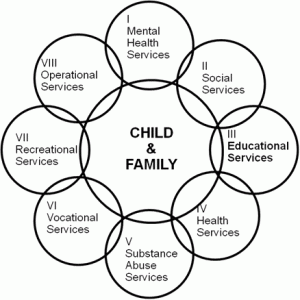Defining the System of Care Concept
Defining the System of Care Concept
First published in 1986, the definition of a system of care was stated as being a “comprehensive spectrum of mental health and other necessary services which are organized into a coordinated network to meet the changing needs of children and their families” (Stroul & Friedman, 1986, p.3). In 2005, an updated definition was developed by a consortium of professionals, family members, and youth:
“A system of care is a coordinated network of community-based services and supports that are organized to meet the challenges of children and youth with serious mental health needs and their families. Families and youth work in partnership with public and private organizations to design mental health services and supports that are effective, that build on strengths of individuals, and that address each person’s cultural and linguistic needs. A system of care helps children , youth, and families function better at home, in school, in the community and throughout life” (http://www.samhsa.gov/).
System of Care Framework
System of Care Equation
History of the Project
History of the Project
Over the course of the last four years, the Child and Youth Mental Health Network (CYMHN) has explored various ways to inform their decisions regarding enhancements and transformations of the Children’s Mental Health System in the Ottawa region. Precipitated by the Children’s Mental Health Fund, the CYMHN identified that an annual allocation of funds should be set aside for system training dedicated to strengthening and directing the child and youth mental health system.
As a result of the system training fund, Dr. Friedman, a researcher from the University of South Florida (USF), came to present to the CYMHN a model for systems integration. At that time, Dr. Friedman also suggested that CYMHN explore using the System of Care Practice Review (SOCPR-R) tool as a means of determining the priorities for system change.
Given the tools potential, the CYMHN and the Ottawa Children’s Coordinated Access Steering Committee determined that they were in fact interested in using the tool as a system needs assessment. As a result, they approached the Provincial Centre of Excellence for Child and Youth Mental Health at CHEO, in order to determine if the tool was in fact sound and would be endorsed by the Centre. It was determined by the Centre of Excellence that the tool was sound and demonstrated promise. Further, they recommended that since there was currently no Canadian equivalent that a pilot project would be timely.
The CYMHN then decided to invite Sharon Hodges, Ph.D. from USF and John Mayo, Executive Director of a children’s mental health centre in Florida that have experience with the tool and its implementation. The aim of the training provided was to further enhance the CYMHN’s understanding of the System of Care Practice Review. Following the training session, the CYMHN voted to move forward with a pilot project using the SOCPR through Coordinated Access. All members of the CYMHN unanimously agreed to participate in the project by allowing their employees to be interviewed and to open their doors for file reviews. The following agencies also decided to train at least one staff member as an interviewer and trainer.
- Children’s Aid Society of Ottawa
- Coordinated Access and Referral to Services
- Crossroads Children Centre
- Youth Services Bureau
This second level of participation required that each agency lend a staff member to the project for a two week period.
In order to keep the project of a manageable size, it was agreed that Coordinated Access would take the lead with respect to the coordination of the project. Further, the CYMHN agreed that the population of concern would be defined as those with complex needs as outlined by the eligibility criteria for Coordinated Access. Finally, the information gathered during the SOCPR would be reflections of the system (not individual agencies) and thus be an asset to helping the CYMHN make future planning decisions. An application was made to The Provincial Centre of Excellence for Child and Youth Mental Health at CHEO, for a Professional Development Award to ensure that the Ottawa SOCPR-R Reviewers were able to attain a train the trainer’s certification. The grant enabled Ottawa to be self sufficient in the use of the tool and sustain its ongoing use. Further, Ottawa has the only Canadian System of Care Practice trainers. The financial investment, combined with the vision and leadership of the CYMHN, led to the completion of The System of Care Practice Review Final Report 2007-2008.
A review of children’s mental health services was conducted throughout the 2007-2008 fiscal year resulting in The System of Care Practice Review Final Report 2007-2008 and culminated in the following community actions:
- A community plan for the 2008-09 fiscal year was established resulting in;
- A commitment to use the SOCPR for a period of 3 years as a system tool and an agency based QA/QI instrument.
- A commitment to broaden the population of focus to increase the breadth and depth of data thereby enhancing the validity of future systemic evaluations.
- A multicultural brokerage team was developed to develop a strategic plan for the next two years in order to increase our community’s cultural competence.
- An organizational assessment was conducted to explore multicultural competence.
- Strength based goal setting and treatment training was provided to the Ottawa community.
- Formal adoption of the SOC values and principles occurred.
- An Operations and Logistics committee was established to develop a work plan congruent with the vision, values and principles adopted by the CYMHN.
- A community planning day was facilitated by Mario Hernandez and Jody Levinson-Johnson resulting in:
- Commitment to develop a community SOC logic model for system transformation.
- Development of a System of Care Ottawa website.
The use of the SOCPR, the resulting recommendations in the Final Report and the community plan for the 2008-09 fiscal year provided our community with the roadmap to become a “community of practice” and thus be looked to as a model of effective collaboration and a leader in transformation. Our community’s willingness to examine itself honestly with the ultimate goal of improving the overall quality of life of the children/youth and families we serve is what makes Ottawa an exceptional community.



